SAEDNEWS: Lake Zarivar is a breathtaking freshwater lake in Kurdistan, known for its crystal-clear waters, diverse wildlife, and peaceful natural surroundings that attract visitors year-round.
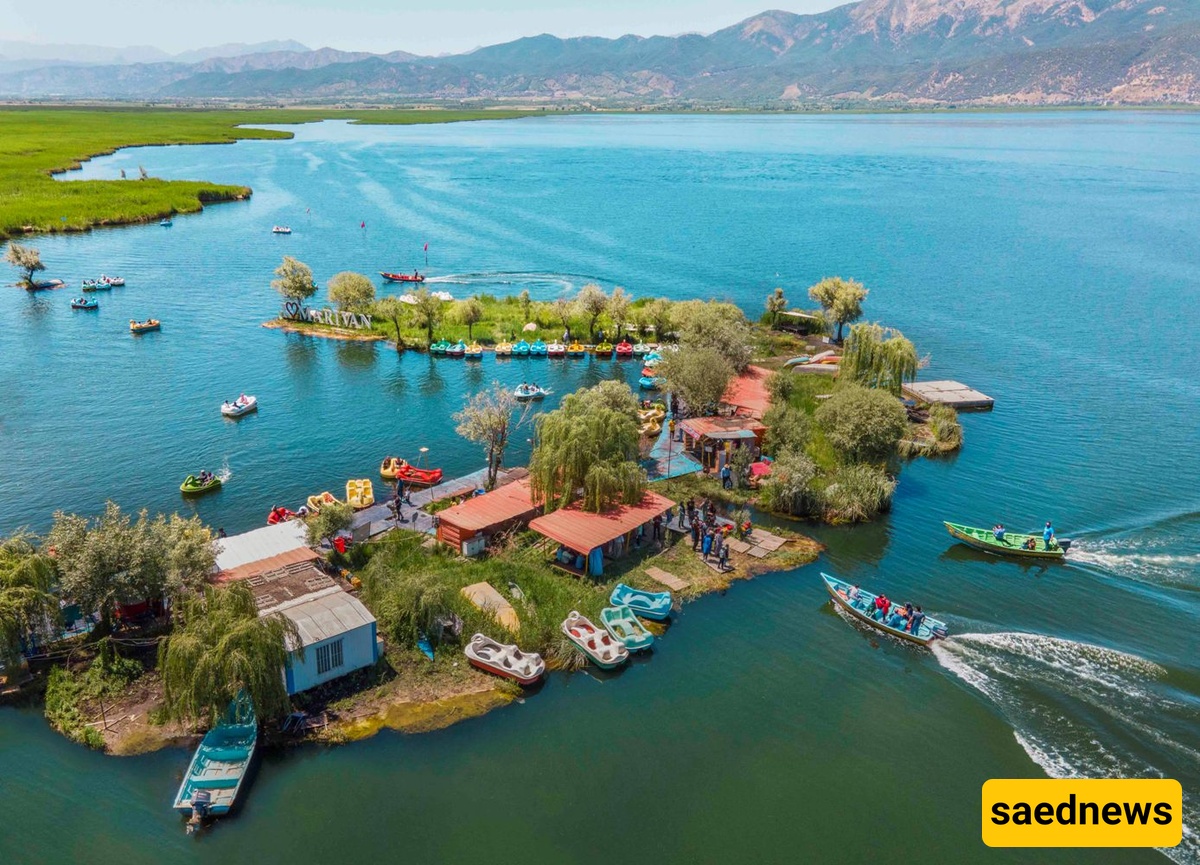
In the northwest of Iran, in Kurdistan Province and 25 kilometers from the city of Mariwan, a turquoise jewel called Lake Zarivar shines. This lake, known in the Kurdish dialect as "Zeribar" or "Zariva," with its 12,000-year history, holds many untold secrets within itself. Zarivar, with its pristine and breathtaking nature, unique biodiversity, and suitable recreational facilities, has become one of Iran’s most important tourist attractions.
There are various opinions about the formation of Lake Zarivar. Some believe that the lake was created due to an earthquake and land subsidence. Others hold that Zarivar is the remnant of an ancient sea that gradually shrank over time.
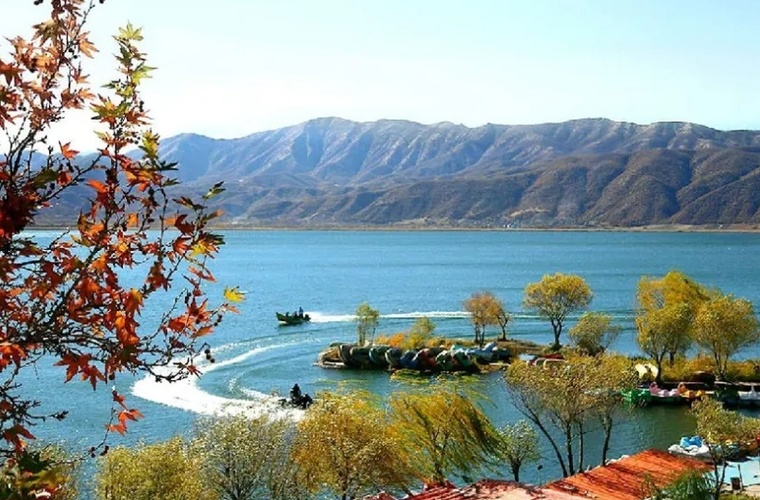
Lake Zarivar is located in a mountainous region at an altitude of 1,285 meters above sea level. This area has a cold mountainous climate with snowy winters and cool, pleasant springs and summers.
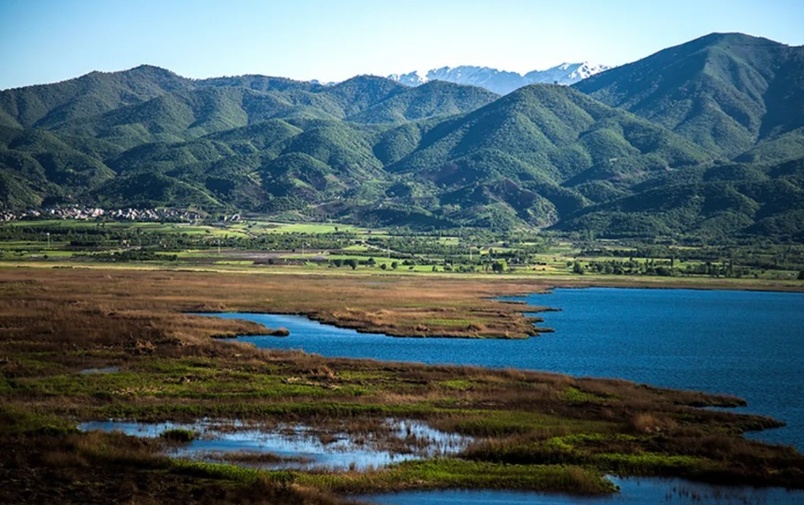
Lake Zarivar covers an area of about 5 square kilometers and has a depth ranging from 2 to 5 meters. Its water is supplied by underground springs and local rivers.
Pristine and Breathtaking Nature:
Lake Zarivar is situated among mountains and lush green forests, creating a unique and stunning landscape. The reflection of the sky on the clear water of the lake forms a painted tableau that captivates every viewer.
Biodiversity:
As mentioned, Lake Zarivar is home to various species of plants and animals. Watching the water lilies that cover the lake’s surface, the flight of migratory birds in the sky, and the swimming fish in the water will provide you with a unique experience.
Lake Zarivar is the most important tourist and recreational attraction in Marivan County. Every traveler and tourist who arrives in this city first asks about Zarivar, making it an excellent place for family picnics and organizing a very enjoyable one-day tour. Wherever you are, you can visit it as part of a Lake Zarivar tour. With its diverse and entertaining activities, you will have a joyful and exciting day at the lake.
Water Activities:
Boating (pedal and motor), water skiing, and fishing are some of the recreational activities at Lake Zarivar. It is important to note that fishing permits are issued from early September to the end of March, and fishing is prohibited outside this period.
Winter Activities:
When the surface of Lake Zarivar freezes in winter, it provides a great opportunity for exciting activities such as skiing and skating.
Paragliding:
There is a paragliding site at Lake Zarivar where you can fly over the lake and enjoy its stunning panoramic views.
Bird Watching:
Lake Zarivar is one of the best bird-watching destinations in Iran. During winter and the bird migration season, countless species, including storks, visit this wetland and even the surrounding villages.
Restaurant Touring:
When visiting Marivan and Zarivar, don’t miss the chance to tour the local restaurants and try the delicious grilled fish of the lake—flavors you may not find anywhere else.
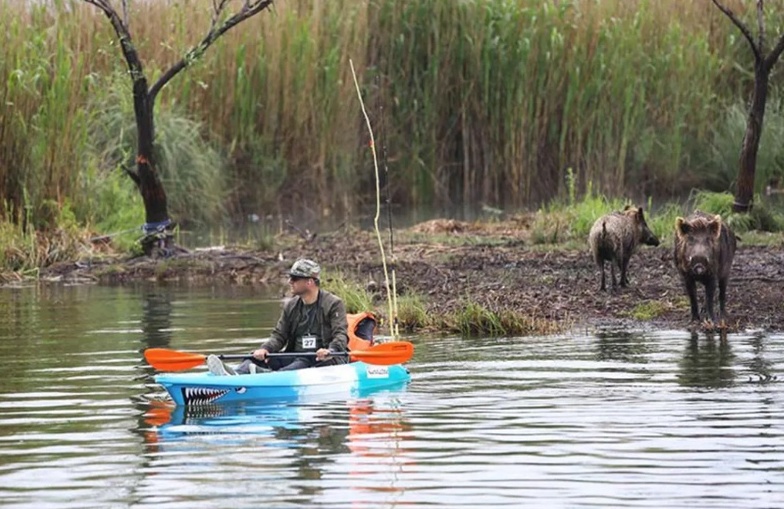
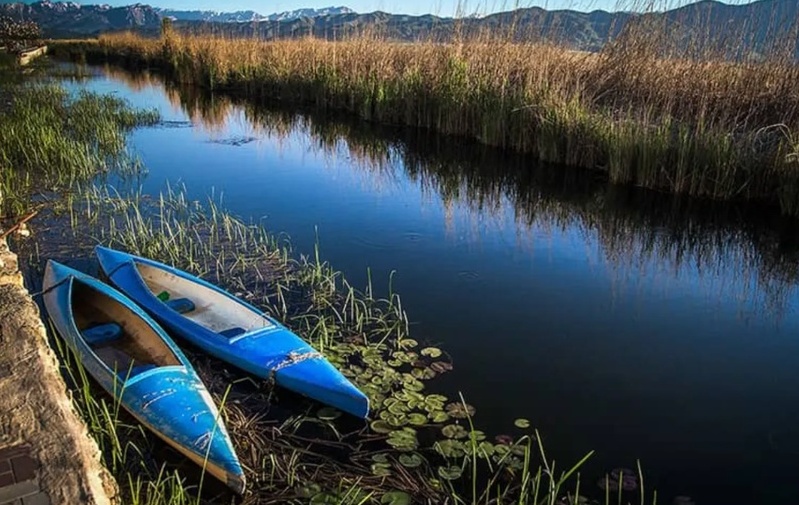
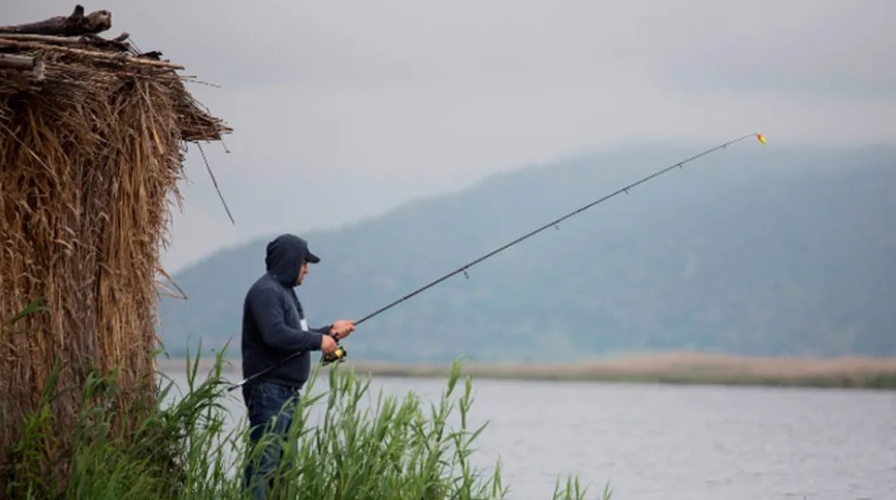
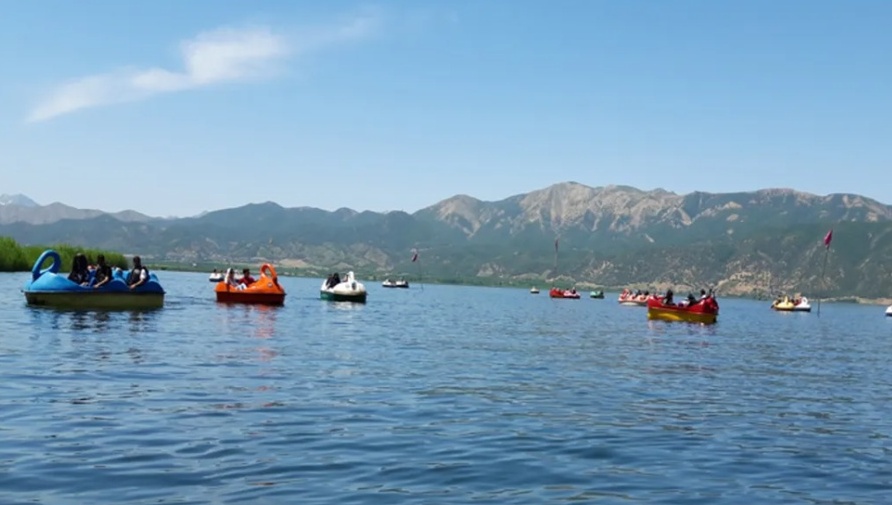
Lake Zarivar in Kurdistan formed in a relatively narrow local subsidence within the Sanandaj-Sirjan belt, which is bounded on the west and east sides by a northwest-southeast longitudinal fault. It is likely that these two faults played a role in the formation of this lake.
Palynological studies have also shown that Lake Mariwan was formed under cold climatic conditions around 20,000 years before Christ.
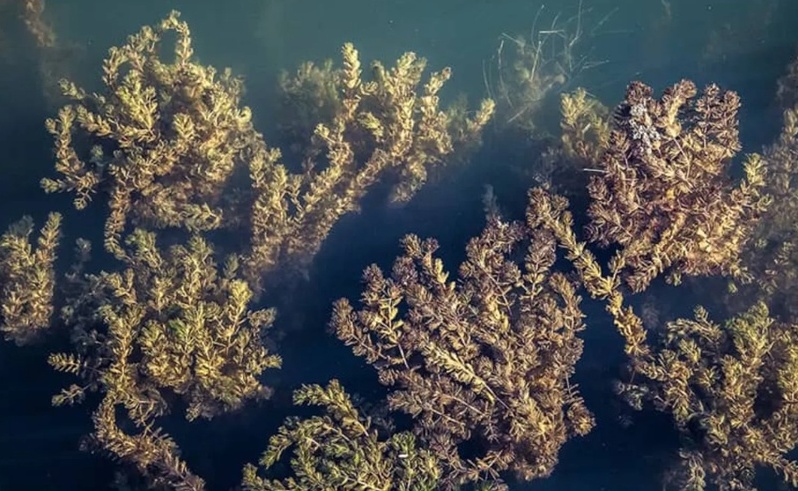
Zarivar is a legendary and mysterious lake about which various myths and stories are told. The first story relates to the tale of a dervish and a tyrannical ruler; the local people of this area believe that at the current site of Lake Zarivar, there was once a city ruled by a cruel governor named Fileh Ghous. One day, a dervish and his wife were passing near the city riding a donkey when the governor’s agents arrested him and brought him to the city. The townspeople and the agents tortured the dervish and his wife severely and forced them to perform hard and exhausting tasks to the extent that the donkey’s tail, which was the dervish’s only possession, was torn off and his pregnant wife lost her child. The dervish, exhausted from the cruelty of the people and agents, went to the governor and demanded justice; however, the governor mocked him and threw him out.
The distressed and heartbroken dervish climbed a mountain east of the city and prayed to the Creator. He cursed the governor, the agents, and the townspeople, saying:
"I will not lift my head from prostration until you level the city with water and destroy these cruel people."
Thus, the lake appeared and the city, its inhabitants, and its cruel ruler disappeared. Even now, the dervish’s grave is at the foot of the mountain, overlooking the lake. Based on this legend, Zarivar is recognized as the lake of justice and has been nicknamed the “Lake of Justice.”
Another story concerns a hidden treasure beneath Lake Zarivar that the lake protects, and so far, no one has found it. Therefore, it is possible that the name Zarivar, and the use of the word "Zar" (meaning gold) in the lake’s name, refers to this buried treasure.
Lake Zarivar is one of the country’s important wetlands and is also considered a wildlife refuge under the protection of the Environmental Protection Organization. This lake, as an ecological unit and aquatic ecosystem in Kurdistan, is a very rare phenomenon that hosts unique species of animals and plants.
The dominant land cover in this area consists of forests and semi-dense thickets, with the main forest species being Persian oak. Other forest species such as wild pear, hawthorn, and almond are seen on slopes and various locations.
Birds: Zarivar wetland has a high potential for attracting waterfowl, shorebirds, and non-aquatic birds, hosting numerous native and migratory bird species. White-winged tern, common teal, cinnamon teal, stork, gray heron, pochard, and rare species such as the spotted cuckoo and the splendid warbler are among the birds of this lake.
Aquatic Species: Native fish such as the spotted black fish, common black fish, fairy fish, dace, shokouli, and gambusia live in this wetland. Non-native fish species include grass carp, mirror carp, common carp, bighead carp, and phytophagous fish.
Mammals: Mammals found in and around Zarivar wetland include the otter (water dog), fox, wild boar, rabbit, wild pig, and brown bear.
Reptiles: In Lake Zarivar, reptiles such as the whip snake, fire snake, ribbon snake, striped snake, and leopard snake from the non-venomous snakes category; the viper and Kurdistan viper from venomous snakes; as well as lizards and species from the families Lacertidae, Geckos, and Agamas can be found.
Plants: Floating plants such as Ceratophyllum and Scirpus, along with thorny plants and species of reeds, watercress, water lily, seven-band grass, bindweeds, rue, watercress, comfrey, and mint make up the plant cover of this wetland.
Zarivar wetland is the seventh wetland in Iran to be registered in the Ramsar International Convention after the Islamic Revolution.
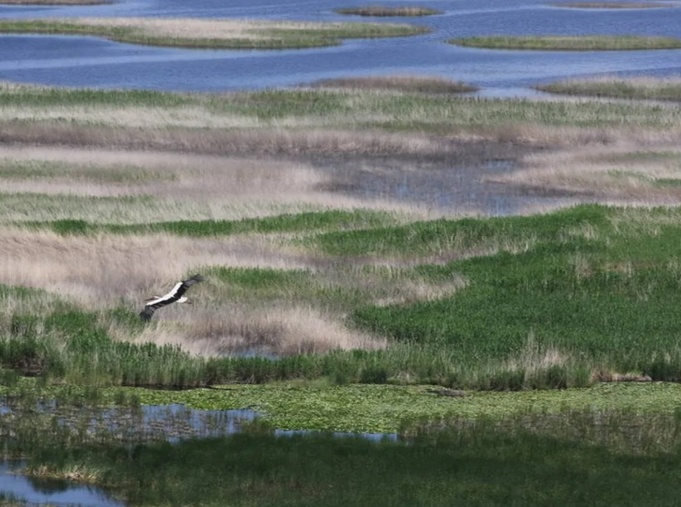
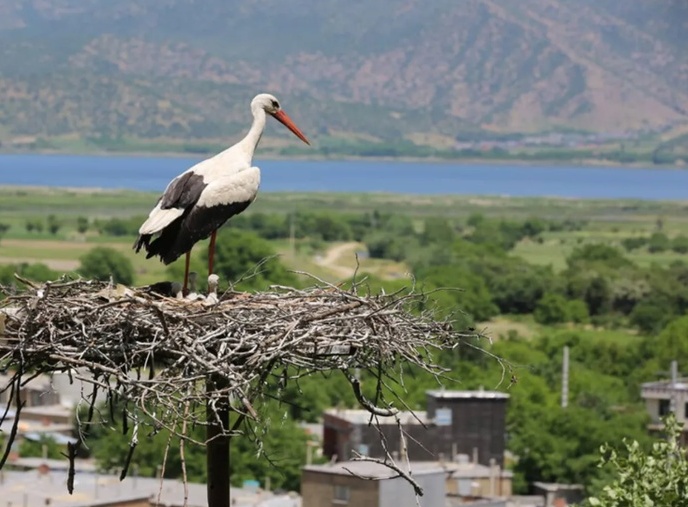
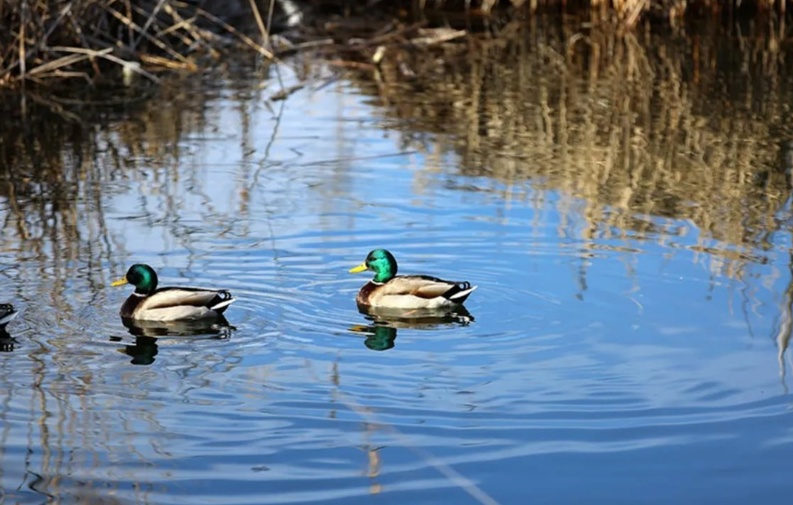
Around Lake Zarivar, various recreational facilities such as restaurants and accommodations have been provided for tourists.
Due to its natural beauty and recreational facilities, Lake Zarivar is one of the most important tourist attractions in Kurdistan Province. The lake welcomes many tourists every year from both inside and outside the country.
Due to its location and distance from the city’s noise, Lake Zarivar is a calm and quiet place for rest and rejuvenation.
The clean and cool air of the Zarivar area makes this place an ideal resort to escape the summer heat.
Lake Zarivar is a suitable destination for traveling with family and friends. There are various recreational activities for all age groups here.
The best time to visit Lake Zarivar is in spring and summer. During these seasons, the weather is cool and pleasant, and the nature of the area is lush and scenic.
You can travel to Lake Zarivar by land or air.
This village is located near Lake Zarivar and, due to its stepped architecture and pristine nature, has become one of the tourist attractions of the region.
This cave is located near Kani Sepi village.
This park is located on the edge of Lake Zarivar and is a suitable place for walking, cycling, and picnics.
In this bazaar, you can buy various souvenirs and handicrafts from Kurdistan.
Lake Zarivar, with its unique natural beauty, attracts many tourists every year. If you are looking for a memorable and unforgettable trip, we recommend traveling to Lake Zarivar.

